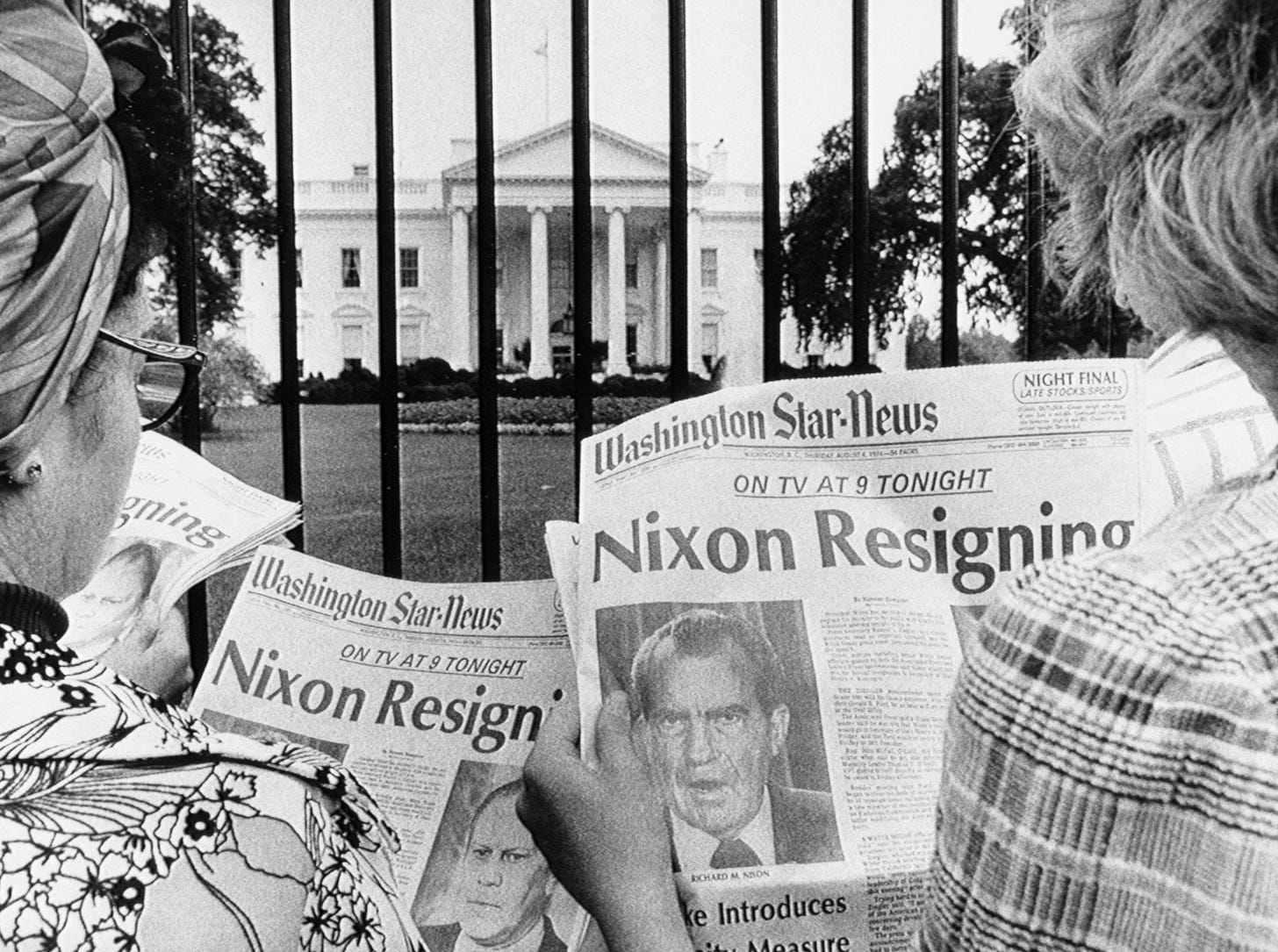What Good Is Impeachment, Anyway?
It has never successfully been used to hold a president accountable—but Congress should still try.

Our nation has a history of failing to hold its leaders responsible for their actions, but we must keep trying to live up to the expectations set forth in the Constitution.
In the summer of 1787, the delegates who gathered in Philadelphia to craft a new government knew that if the states ratified the Constitution, George Washington would become the first president. They trusted him to lead with honor and virtue. But they worried about his successors—a subject awkward to discuss, with Washington attending every session as the president of the convention.
Benjamin Franklin was one of the first to acknowledge the elephant in the room. He stated that he was confident the early officeholders would be upstanding, but it was essential “to provide in the Constitution for the regular punishment of the Executive when his misconduct should deserve it, and for his honorable acquittal when he should be unjustly accused.” As the convention’s elder statesman—Franklin was a decade and a half older than the next-oldest delegate, and perhaps more famous than any American other than Washington—his words carried great weight. After considerable debate, the Framers spelled out a process for presidential impeachment in the first and second articles of the Constitution.
As a result, the Constitution emphasized the importance of presidential accountability from day one. But for many reasons—political calculations, behind-the-scenes dealings, and death—Congress has rarely held presidents accountable through impeachment. To be sure, the threat of impeachment has often weighed on past presidents, but impeachment has never been effectively used to oust a president, let alone bar one from holding office in the future.
In 1868, the House of Representatives voted to approve articles of impeachment against a president for the first time. Republicans in Congress used President Andrew Johnson’s violation of the Tenure of Office Act as the pretext for impeachment, but they were actually furious with him for undermining Reconstruction and the civil rights of newly enfranchised African Americans. Johnson had welcomed former Confederate officers back into the government a bit too warmly; vetoed funding for the Freedman’s Bureau to provide training, education, and housing assistance to recently emancipated black Southerners; and opposed the Fifteenth Amendment.
A majority of senators voted in favor of impeachment, but they failed to meet the two-thirds majority by one vote. Historians now believe that a series of bribes and shady dealings may have secured Johnson’s acquittal.
Ultimately, Johnson left office after both the Democratic and Republican parties rejected him as their candidate in the 1868 election. Ulysses S. Grant, Johnson’s successor, was left to clean up the mess the former president had made of Reconstruction. Six years later, Johnson was elected to represent Tennessee in the U.S. Senate. While history remembers him poorly, he faced few consequences for his actions during his lifetime.
When Warren G. Harding died unexpectedly in August 1923, his administration was mired in several corruption scandals. In 1922, the Senate had begun to investigate Department of Interior leases for Teapot Dome oil fields. After Harding died, the Senate uncovered evidence that Interior Secretary Albert Fall had accepted bribes in return for distributing the contracts to friends in a secret deal. Fall was eventually convicted and became the first cabinet secretary to serve a prison sentence.
Around the same time, scandal engulfed the Veterans’ Bureau, which Congress had created in August 1921. Harding had appointed one of his old buddies, Charles Forbes, to run the bureau. Less than a year later, Harding received reports that Forbes was using the position to enrich himself while leaving thousands of veterans without the proper care. Harding confronted Forbes, but then allowed him to remain in office for another nine months and spend several weeks touring the cities of Europe. Forbes finally resigned in the spring of 1923 and Congress opened an investigation into the misuse of federal funds.
When Harding died, he had not yet been implicated in either of these scandals, but his questionable choices for cabinet secretaries reflected poorly on his leadership. The subsequent investigations showed little interest in dragging Harding’s reputation through the mud after his death. Harding’s name continues to be associated with corruption and scandal in the presidency, but the extent of his connection with these scandals remains unknown.
No president more spectacularly avoided accountability than Richard Nixon. In July 1974, the House Judiciary Committee recommended three articles of impeachment against the president. On August 7, a few key Republican senators privately visited Nixon at the White House and warned him that after the House of Representatives, which then had a Democratic majority, inevitably voted to impeach him, enough Republicans would join the Democratic majority in the Senate to remove him from office. The day after this private meeting, Nixon resigned as president before the House could take the vote. One month after his resignation, President Gerald Ford issued a full and unconditional pardon for all crimes Nixon “committed or may have committed or taken part in” as president.
While Ford determined to pardon Nixon to help the nation heal and move beyond the Watergate scandal, his decision effectively ended all possibility of holding the former president accountable for his actions.
Since Watergate, there have been three presidential impeachments: Bill Clinton’s in 1998, Donald Trump’s in 2019, and Donald Trump’s last month. The first two resulted in acquittals. Only one senator from the opposite party has ever voted in favor of conviction—Mitt Romney in Trump’s first impeachment. It remains to be seen how the Senate will vote on Trump’s second impeachment. If the Senate doesn’t find Trump’s behavior cause for conviction, it’s hard to imagine what would count as cause for conviction.
The nation has often failed to live up to the lofty standards articulated by Benjamin Franklin and the other Framers of the Constitution. But there’s still time—we can and must do better.

